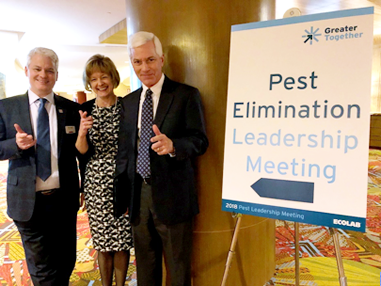EDUCAUSE CEO and President John O'Brien provides an update on the March 2018 EDUCAUSE Board of Directors meeting.

The most recent EDUCAUSE Board of Directors meeting was held in March 2018, side-by-side with the EDUCAUSE Enterprise IT Summit in Orlando, Florida. This co-location provided a number of opportunities for board members to interact with conference attendees, including the CEOs and other leaders from the governing boards of NACUBO (National Association of College and University Business Officers) and AIR (Association for Institutional Research), our co-sponsors for the summit.

Expanding our collaborative efforts with other leadership organizations is a strategic priority for EDUCAUSE, and we are extremely proud of our partnership with NACUBO and AIR to address the challenges facing higher education.
The agenda for any board meeting tends to be a combination of routine reports, trending topics, and a view of what's on the horizon for the association and higher education. Among the reports given at our March board meeting were highlights from the successful 2017 Annual Conference and the positive trends in attendance and engagement for our other face-to-face and virtual events during the past year. Of course, we hope to build on this momentum, and there is great energy around planning for the 2018 Annual Conference in Denver, with significantly more session proposals submitted and under consideration by the annual conference program committee. Continuing a topic that was introduced at a previous meeting, the board heard about recent activities and discussions with our membership to reimagine the EDUCAUSE Learning Initiative (ELI).
Following on the board's approval in October of our 2018 organizational goals, we provided a progress report toward those goals and our strategic priorities, noting the success achieved in each of the categories and calling out areas where more attention will be given in the months ahead. We have made strides in advancing and re-envisioning our professional learning program and have begun delivering personalized content to members. Future plans include an increasing focus on mentoring, developments to expand the utility and value of the EDUCAUSE profile, and the incorporation of diversity, equity, and inclusion (DEI) throughout our programming. On this last point, board members recognized the significant work being done by the DEI Task Force, co-chaired by board member Keith W. "Mac" McIntosh from the University of Richmond.
The March meeting was an ideal time for the board to take stock of the new EDUCAUSE member model that has been in place for one year. In general, the new model has garnered positive feedback from members, who are pleased to receive ELI and ECAR benefits as part of their basic membership. By any measure, the transition was a success, exceeding the renewal, retention, and financial targets set by the board a year ago. The new model has attracted several first-time members and has persuaded other institutions to rejoin EDUCAUSE after a period of time away. Now that we're a year into the new model, the board studied variations in renewal rates by institution type. An impact analysis of the new model suggested, and the board approved, shifts in the model and in planned 2018 dues increases to help ensure strong retention and affordability for all EDUCAUSE members.
In fiduciary matters, the board received a summary of the association's final unaudited financial results from 2017. The EDUCAUSE financial picture is sound, with positive growth in our investments, corporate sponsorships, and salary savings in 2017. The 2018 operating and capital budgets were approved, including extensive investments in support of strategic priorities.
The board dedicated time to a discussion of EDUCAUSE's recent acquisition of the New Media Consortium (NMC) and began to develop a framework to guide us in the event of future opportunities of this kind. After discussing the report of a working group that investigated the concept of a peer-review service to be offered by EDUCAUSE, board members deciding to go forward with a limited implementation of some of the group's recommendations.
A recurring feature at recent board meetings has been to hear from leaders in other sectors of higher education. This time, board members heard from Rick Legon, president of the Association of Governing Boards (AGB), who presented AGB's efforts to advance the effectiveness of trustees serving in higher education institutions. (An article I've written about how boards should best engage with technology initiatives is in progress for publication in AGB's Trusteeship magazine.) Jarret Cummings, EDUCAUSE director of policy and government relations, gave board members an overview of the association's activities and strategy in the policy arena and provided the status of several policy issues affecting higher education in the current turbulent political environment (the EDUCAUSE Review Policy Spotlight blog also provides regular updates).
I end each board meeting with a renewed sense of appreciation for our remarkable board members. They all bring energy, insight, and fresh and relevant perspectives to their work in guiding EDUCAUSE, and it's a privilege to serve with them.

John O'Brien is President and CEO of EDUCAUSE.
© 2018 John O'Brien. The text of this work is licensed under a Creative Commons BY-NC-ND 4.0 International License..
